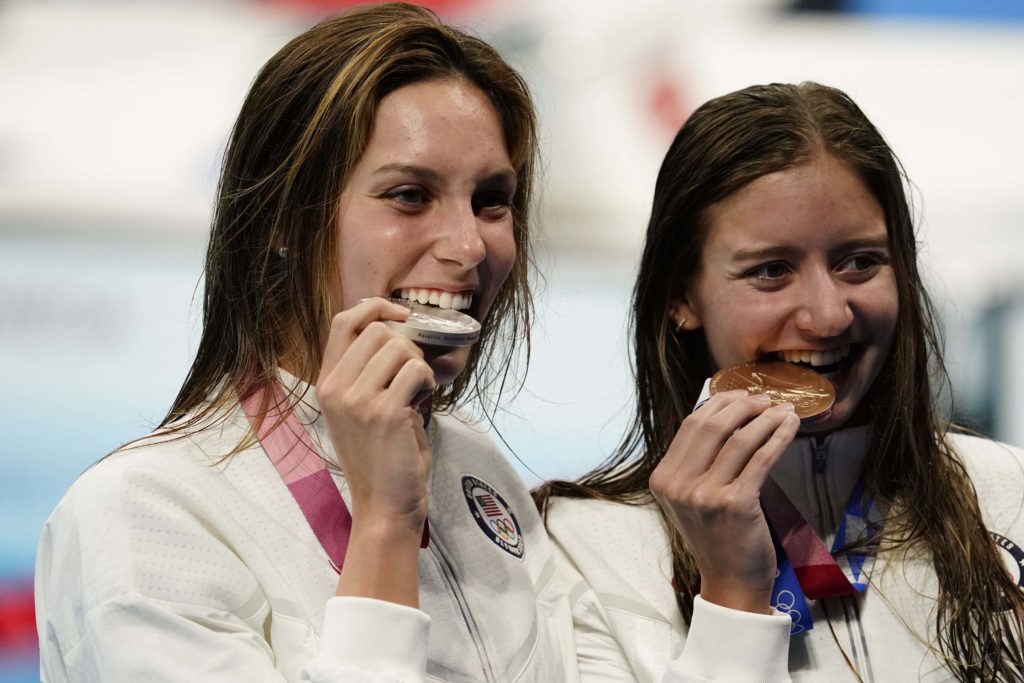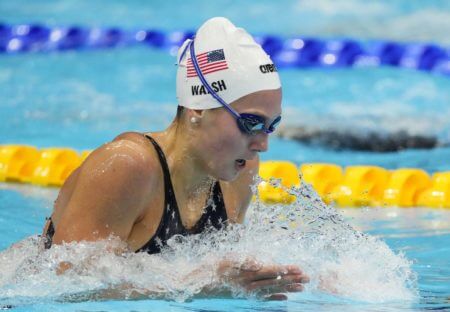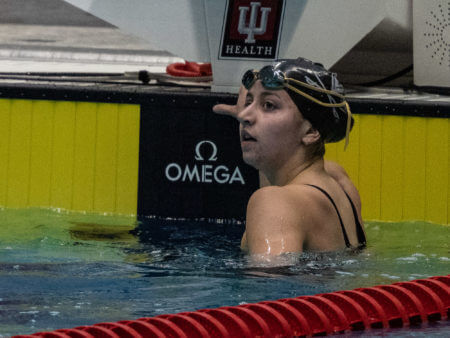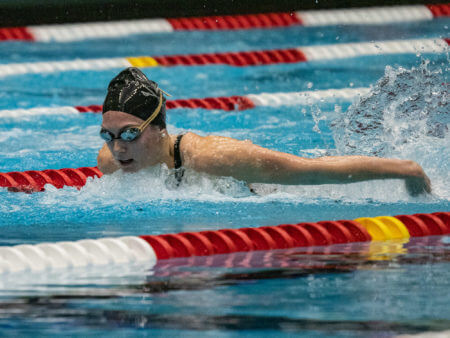After Olympic Glory, Alex Walsh and Kate Douglass Pursuing Another Championship for Virginia

After Olympic Glory, Alex Walsh and Kate Douglass Pursuing Another Championship for Virginia
For Alex Walsh and Kate Douglass, the signature moments of their swimming careers happened together, on the morning of July 28 in Tokyo. The two University of Virginia swimmers were each competing in their first Olympic final, Walsh in lane three and Douglass in lane four as medals were on the line in the 200 IM. Months after two 19-year-olds had helped deliver a national championship for their Cavaliers, the first ever for the school’s swimming program, they would be right next to each other in the biggest moment of their respective swimming careers.
Looking back months later, what stands out for Walsh is the stress and tension that led up to that final.
“Going to the Olympics, I think people kind of romanticize it,” Walsh said. “I remember the night before, I was in tears, and I was texting with my parents. I don’t even know what time it was for them. I was like, ‘I’m so nervous,’ and ‘I want to medal.’ I was getting so caught up in the fame that you would get if you got a medal, and I just had to think to myself, ‘That doesn’t really matter. Just focus on your own race.’”
But one part about that Olympic final made it feel much more routine. “I’m really happy that Kate was right next to me. Having here there was almost a sense of everything being normal,” Walsh said.

Alex Walsh racing in the 200 IM at the Tokyo Olympics — Photo Courtesy: Rob Schumacher/USA TODAY Sports
Walsh turned third at the halfway point, but on the breaststroke leg, she surged past the field and into the lead with 50 meters to go. Immediately, she began getting challenges from Japan’s Yui Ohashi, already the 400 IM gold medalist, on her left and from Douglass on her right. Despite all the fears she faced in the immediate leadup to the race, Walsh swam the best race of her life, and she held tough until the very end, when Ohashi got past her by 0.13 to claim gold. However, Walsh did claim an Olympic silver medal.
“I couldn’t be happier with the fact that I went a best time and also got a silver medal. It’s crazy. Sometimes I think about it still, and I’m like, ‘I can’t believe that was me who did that four months ago.’ It was awesome,” Walsh said. “Definitely the experience of a lifetime.”
Meanwhile, one lane over, Douglass finished with the second-quickest freestyle split, and that was enough for her to edge out Great Britain’s Abbey Wood by 0.11 to earn bronze.
Return to College Swimming
That one race meant that the two would forever be Olympic medalists, along with fellow Cavaliers Paige Madden (silver on the 800 freestyle relay) and Emma Weyant (bronze in the 400 IM). How can you top that? Douglass admitted that it took some time to get comfortable with moving on.
“It was definitely just a really exciting summer, and kind of decompressing from all of that took a while,” Douglass said, before adding that she prioritized taking a three-to-four-week break from swimming for a full reset before the college swimming season began. “It’s kind of crazy that I accomplished the pinnacle of swimming. I went to the Olympics. What else is there for me to do now? I think it’s helpful that I’m back with my college team and focusing on the NCAA season now.”
Yes, the college swimming season, where Virginia is tasked with defending a national championship. In March 2021, the Cavaliers won the NCAA team title 137 points over conference rival NC State. Douglass was the national champion in the 50 freestyle as well as the runner-up in the 100 butterfly and 100 freestyle, while Walsh dominated the 200 IM at the national championship and swam on the first-place 800 free relay for the Cavaliers.

Kate Douglass after a race in May 2021 — Photo Courtesy: Peter H. Bick
In that 2021 title-winning effort, Virginia’s clear MVP was Madden, the distance freestyler who finished first in three individual events at the national championships, but now, Madden has moved on to the professional swimming ranks. That leaves Douglass and Walsh as the pivotal swimmers for UVA as the team faces much tougher competition this go-round.
Undoubtedly, Virginia’s biggest challenger for the 2022 national title will be Stanford, previously the national champions in 2017, 2018 and 2019. The Cardinal fell to ninth nationally a season ago, but this year’s team features three Olympic medalists who did not compete last year: Regan Smith, Torri Huske and Taylor Ruck.
“We definitely have a target on our backs this year, more so than last year,” Douglass said. “There’s obviously going to be a lot more competition at NCAAs this year. But I think we’re just using that to motivate us. We’re just kind of using last season to get us going because we want to do that again.”
Strategizing a National Title Defense
Coming off this past weekend’s Tennessee Invitational, Virginia’s primary midseason meet, head coach Todd DeSorbo and co. cannot help but be pleased with where the team stands — and a big reason is the performance of Virginia’s two stars.
In Knoxville, Douglass recorded the country’s top time in the 200 IM at 1:52.21 and in the 50 free at 21.27. Neither was a huge surprise since Douglass won Olympic bronze in the long course version of the 200 IM and was the NCAA-title winner in the 50 free last year. But then, she swam a 2:03.58 in the 200 breast, making her the fourth-fastest performer ever in that race
“I didn’t know if I was ever going to go that fast because I don’t choose to swim the 200 breast very often, so that was definitely a surprise,” Douglass said. “My breaststroke had been feeling really good in practice beforehand, so I had a little bit of confidence going into that race that I could at least be close to my best time.”
Interestingly, Douglass was far from committed to swimming the 200 breast at the NCAA Championships, despite having swum a time that would have won last year’s title. She enjoyed just focusing on sprint free and fly training for last year’s national meet, a strategy which paid off beautifully, and she admitted that training for the 50 free, 100 fly and 200 breast concurrently would be unusual. Certainly, she is the only swimmer in the country who would have legitimate national-title hopes in a slate of events so diverse.
Walsh, meanwhile, also put up times that merit national-championship consideration in events she rarely competes in. She swam a 4:01.40 in the 400 IM in Knoxville, faster than last year’s NCAA-winning time. In that one race, Walsh and teammates Ella Nelson and Weyant recorded the country’s top three times in the event.
Earlier in the year, UVA associate head coach Blaire Bachman told Walsh she should swim the 400 IM at least once this season, and Walsh opted for midseason “to get it over with because I don’t want to swim it at ACCs or NCAAs.” But after that 4:01, DeSorbo told Walsh, “You just bought yourself more 400 IMs.” Walsh, realizing the significance of her effort, did not protest.
But maybe even more surprising than her 400 IM was Walsh’s performance in the 200 fly. She swam a 1:51.83, the fastest time in the country so far this year and quicker than all but one swimmer from NCAAs last year — in a stroke that most would consider Walsh’s weakest.

Alex Walsh racing butterfly at the TYR Pro Swim Series in Indianapolis — Photo Courtesy: Peter H. Bick
“I swam 200 fly at some of our dual meets because one of our 200 flyers was out with a shoulder injury. I like the event. I think I like it because I don’t really have any expectations for myself,” Walsh said. “Even though I would say I’m a better 200 backstroker than I am a 200 flyer, but that event is so crowded and so hard to fight for a top-three finish.”
After winning the 200 IM national title as a freshman, Walsh ended up fifth in the other two individual events she swam, the 200 free and 200 breast, so she was thrilled to see herself making progress in other events and giving herself more chances to contribute to the UVA cause on the national level.
“When we taper more, I’m really excited to see if I can drop more in those events,” Walsh said. “In terms of when we do our NCAA schedule, the end goal is to score as many points as possible, so we’re definitely going to be keeping that in mind when we’re choosing my events.”
The Challenges Ahead
Before this summer and her Olympic-medal breakthrough, Douglass never imagined a career for herself as a professional swimmer. She figured she would be done competing before the U.S. selected a team for the 2024 Olympics in Paris. Now? That Olympic experience changed what Douglass expected from her swimming career long-term
“Honestly, it definitely did,” she said. “After having that experience, I’ve kind of realized that going to the Olympics again could be a possibility, or I could at least go to Olympic Trials again and do really well.”
Walsh, too, has the goal of adding a second Olympics to her résumé in less than three years, and she views the Tokyo experience as one she can build off. “Just thinking already about going and competing there, it’s just not as stressful as it was the first time,” she said.
Of course, that’s well into the future and not to be concerned with right now, not with the impending challenge of an NCAA Championships that figures to be much tougher than anything UVA faced in its first title-winning season. The challenge will be standing tall and keeping the mood light and performing even in the face of heavy pressure, the same intangible forces that Walsh overcame on her way to the Olympic silver medal.
“We know that every single point is going to count now more than ever, so I think people are going to put a lot of pressure on themselves to not get touched out. I’m worried that people are going to just get really frustrated and very stressed before their races,” Walsh admitted. “It’s easier just to swim and have fun when you don’t feel the pressure of, ‘If I don’t get this place, then my team is not going to win.’ But at the end of the day, I hope we can pull it off again. That’s obviously the goal.”
If Virginia can win back-to-back national titles, that would mark a huge accomplishment for a program that fancies itself as an up-and-comer in the swimming world. But these days, no one questions the Cavaliers’ place among the sport’s elite. Over the past year, that status has been evident at both the college level and the international level, especially after the race when two Virginia swimmers stood together on an Olympic podium.




.png)
Didn’t Weyant get silver in the 400 IM at the Olympics?
Yes, it was silver…great article, though…
So proud
The utterly pointless cliche of biting medals continues. Photographers come off it!